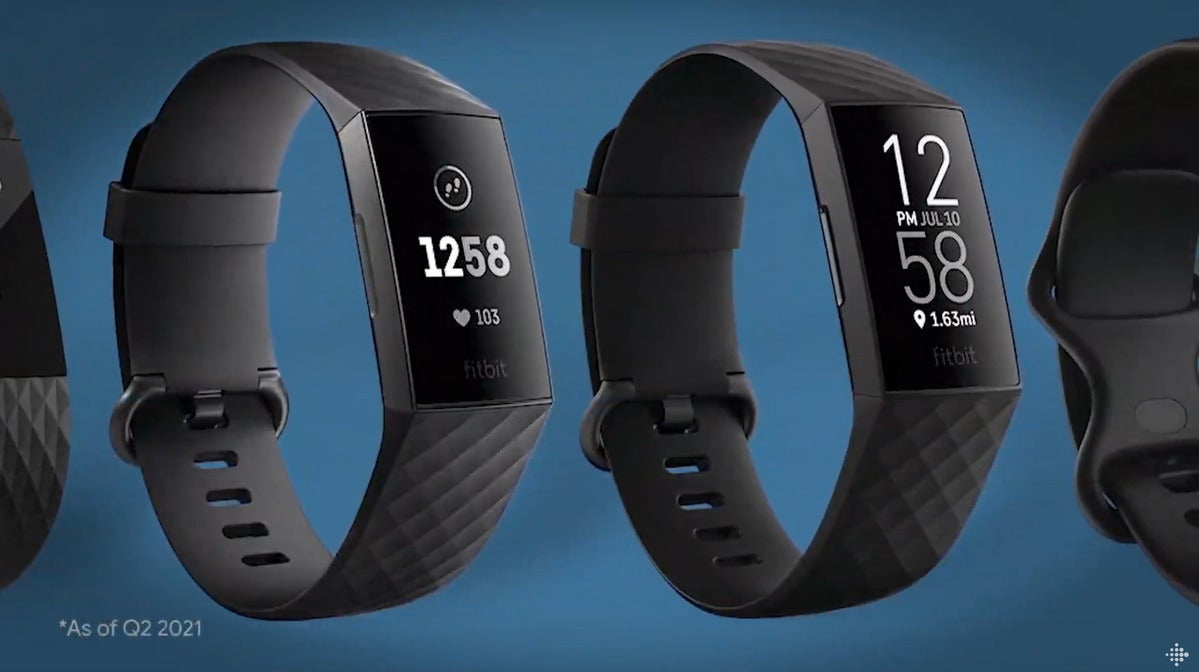The company finally teased how it’ll handle smartwatches in relation to Wear OS.
Fitbit
Today’s Best Tech Deals
Picked by PCWorld’s Editors
Top Deals On Great Products
Picked by Techconnect’s Editors
Fitbit officially unveiled its latest fitness tracker on Wednesday, but for those following the rumors and leaks, the announcement of the Charge 5 comes as little surprise. Far more interesting are the new features of the Charge 4’s successor and the coming updates to Fitbit’s Premium service launching alongside it—plus the tantalizing hint dropped about the Google-owned company’s involvement with Wear OS (formerly Android Wear) devices.
Design and features
More streamlined, colorful, feature-rich, and expensive is the fastest summary of the Charge 5. Compared to its predecessor, it’s thinner by 10 percent, with a flatter shape and rounded edges similar to Fitbit’s smaller Luxe tracker. However, it still sports the same maximum battery life of up to seven days, despite that downsizing and a switch to a color AMOLED screen two times as bright as the monochrome Charge 4. Reading the Charge 5 in bright sunlight and indoors should be easier than with the Charge 4, as Fitbit has paired the brighter display with an ambient light sensor for automatic dimming as well. This tracker also now includes an Always-On Display option, eliminating the need to move your wrist to see the screen.
Also new are a built-in electrocardiogram (EKG) app and electrodermal activity (EDA) sensor, features previously limited to Fitbit’s smartwatches. The company says that the EKG app can be used to check for indications of atrial fibrillation (“afib”), or irregular blood pressure, which can lead to future heart problems like blood clots, stroke, heart failure, and other complications. As part of monitoring heart health, the Charge 5 will also show notifications when your heart rate is above or below your normal range.
 Fitbit
FitbitIn contrast to previous Charge trackers, the new Charge 5 will sport a color screen and 20 clock-face options that take advantage of it.
The EDA sensor, for its part, monitors miniscule electrical changes on your skin—a potential indicator of stress. Stress was a dominant theme during Fitbit’s Charge 5 reveal, with an emphasis placed on how the Charge 5 and the Fitbit app together can help users track and reduce their stress levels. Fitbit has also enabled a higher number of exercise modes, with 20 available, putting the Charge 5 on par with the company’s smartwatches.
Pricing and extras
Making a return from the Charge 4 are built-in GPS tracking, which can be used to get real-time feedback on pace and distance during runs; auto exercise recognition; an estimate of your VO2 max; and support for Fitbit Pay. Unfortunately, the Charge 4’s MSRP of $150 won’t carry over. Available for pre-order today, the Charge 5 costs $180 USD (€180 / $270 AUD) for its three color options—black, platinum, and gold—plus extra for optional sport, nylon hoop and loop, or leather bands.
Included in that higher price tag is a six-month trial for Fitbit Premium, which normally costs $10 per month (or $80 per year) for access to more detailed stats, guided programs, workouts from companies like barre3 and Les Mills, and more. In tandem with the Charge 5’s launch, Fitbit is expanding Premium, with a new Daily Readiness feature available for Charge 5, Sense, Versa 3, Versa 2, Luxe, and Inspire 2 users that offers a tailored set of recommendations each day for your body’s current state. Get a low number, and you’ll be directed to take it easier in the form of yoga and mindfulness sessions. A high number means you’re ready to rock a personalized goal for Active Zone Minutes and high-intensity workouts. Sense and Versa 3 users will also gain a Snore and Noise Detect feature, which uses the built-in microphones on those smartphones to analyze and track snoring and noise during sleep.
What lies ahead
 Fitbit
FitbitIs the Charge 5’s adoption of previously smartwatch-only features a hint at how the company will handle its trackers versus its smartwatches?
The Charge 5’s adoption of smartwatch features may be a clue about the future of Fitbit’s Sense and Versa lines. Since Google’s acquisition of Fitbit, which began in 2019 and became final in January 2021, many have wondered how exactly the fitness tracking company would fit into Google’s plans for Wear OS devices. During the Charge 5 announcement, Fitbit co-founder James Park said that Fitbit’s “most popular features” will become available on Wear watches, including the tracking of “health progress” during the day. Fitbit will also build “premium smartwatches based on Wear” that combine Fitbit and Google’s fields of expertise.
Whether these statements mean we’ll see Fitbit behind the production of Google-branded Wear OS watches (perhaps the long-anticipated Pixel Watch?), or a shift to Wear OS in the Sense and Versa lines remains to be seen. Park said that details specific to how Fitbit and Google will work together will come in a later reveal.
Note: When you purchase something after clicking links in our articles, we may earn a small commission. Read our affiliate link policy for more details.


